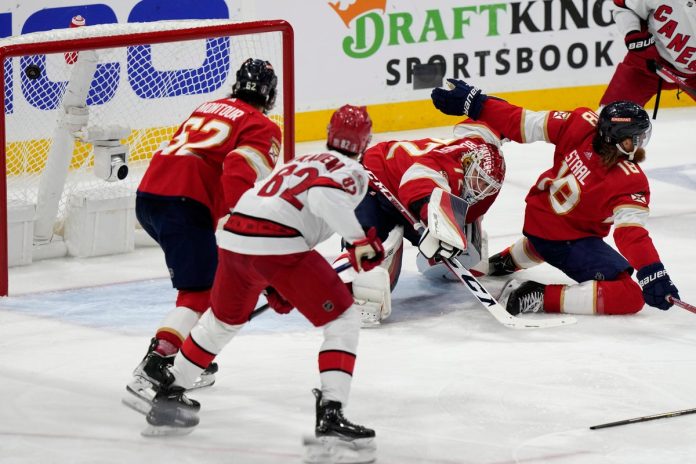Hockey fans are bombarded with logos and advertisements for legal sports betting as often as every 13 seconds during major games, a new study has found.
Analyzing TV broadcasts of June’s Stanley Cup finals between the Florida Panthers and Edmonton Oilers, researchers at the University of Bristol found an average of 3.5 marketing messages from betting firms every minute, with 4.7 gambling-related messages per minute in the most saturated game.
The scholars, who shared their work in the The Guardian, also looked at the recent NBA Finals between the Indiana Pacers and Oklahoma City Thunder, finding a far lower share of gambling ads, with .26 betting-related messages and logos per minute.
Advocate Joe Maloney of the American Gaming Association told the outlet that the multi-billion dollar legal U.S. sports betting industry advertises responsibly, and makes up less than one percent of U.S. TV advertising, paling in comparison to industries like alcohol or pharmaceuticals.
“If UK professors are interested in the robust AGA member company commitments to responsible advertising, they’re welcome to engage with us directly in lieu of their now annual and predictable leaks to UK-based media outlets,” he said.
The Independent has contacted Gamblers Anonymous and the National Council on Problem Gaming for comment on the findings.
Since a 2018 Supreme Court decision that effectively legalized sports gambling in the U.S., the practice is now legal in 39 states and Washington, D.C.
The industry now counts annual wagers approaching $150 billion, which backers say has been a boon for state tax coffers, while critics argue sports betting is driving gambling addiction and other problem behaviors.
According to a February study from University of California, San Diego researchers, internet searches for help with gambling addiction increased 23 percent nationally between 2018 and June 2024.
Legalizing sports betting has meant “hundreds of billions of wagers, mostly online, coinciding with record-breaking demand for help with gambling addiction as millions seek help,” researcher John W. Ayers, deputy director of informatics at UC San Diego Altman Clinical and Translational Research Institute, wrote of the findings at the time on a university website.
Research also suggests that in states with legal sports betting, the already documented phenomenon of partner violence increasing after sudden pro football team loses can be exacerbated.
According to the National Council on Problem Gambling, states invest about .0009 cents in gambling addiction support for every dollar generated from commercial betting.
Approximately 2.5 million people in the U.S. are thought to meet the criteria for severe gambling addiction, while another 5 to 8 million are thought to have mild to moderate gambling problems.
As The Independent has reported, online prediction markets have increasingly moved beyond traditional topics like sports to include popular betting on issues like U.S. elections.
The development has generated mixed response from observers, some of whom see a way to increase civic participation and generate more accurate real-time pictures of the national mood, while others see the potential for corruption.


